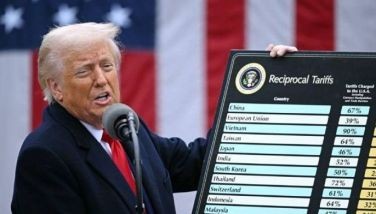Oil firms not keen on dollar hedging proposal
October 20, 2000 | 12:00am
Oil companies are not keen on a proposal by the Bangko Sentral ng Pilipinas (BSP) for them (oil companies) to avail themselves of a dollar hedging mechanism called currency rate protection program (CRPP).
Instead, the oil companies are in favor of re-adopting the pre-deregulation formula that offers a much lower premium on the hedging mechanism amounting to about 0.375 percent per annum.
Petron Corp. said it may avail of the CRPP "when necessary."
Petron spends an average of $120 million a month to purchase its crude oil requirements.
Petron chairman Jose A. Syjuco Jr. said they are studying the BSP proposal specifically the pricing structure of CRPP. Pilipinas Shell Petroleum Corp. officials likewise confirmed that they are studying the CRPP and the pricing structure.
Syjuco said in a press statement that while the CRPP is a "good step. These are unusual times and the forex coverage should reflect normal market conditions for it to be attractive."
The Petron chairman pointed out that the proposed BSP hedging mechanism will not eliminate the company’s foreign exchange losses caused by the peso’s devaluation and compounded by its continued inability to pass on increasing production costs to consumers.
The country’s oil import bill rose by 26.08 percent from $1.834 billion in 1998 to $2.313 billion in 1999. Import volume, however, dropped by nearly six percent from 135,057 million barrels (MB) in 1998 to 128,166 MB. The oil companies spend at least $300 million a month for crude oil purchases.
Last Tuesday, the Department of Energy (DOE) sponsored a meeting between the three leading oil companies and the BSP to discuss the CRPP.
The CRPP is a foreign exchange hedging mechanism that allows companies to settle in pesos the difference between the forward and spot rate upon maturity. The maturity period reaches a maximum 90 days or three months, and serves as an "insurance policy" for the volatility of the peso.
Instead, the oil companies are in favor of re-adopting the pre-deregulation formula that offers a much lower premium on the hedging mechanism amounting to about 0.375 percent per annum.
Petron Corp. said it may avail of the CRPP "when necessary."
Petron spends an average of $120 million a month to purchase its crude oil requirements.
Petron chairman Jose A. Syjuco Jr. said they are studying the BSP proposal specifically the pricing structure of CRPP. Pilipinas Shell Petroleum Corp. officials likewise confirmed that they are studying the CRPP and the pricing structure.
Syjuco said in a press statement that while the CRPP is a "good step. These are unusual times and the forex coverage should reflect normal market conditions for it to be attractive."
The Petron chairman pointed out that the proposed BSP hedging mechanism will not eliminate the company’s foreign exchange losses caused by the peso’s devaluation and compounded by its continued inability to pass on increasing production costs to consumers.
The country’s oil import bill rose by 26.08 percent from $1.834 billion in 1998 to $2.313 billion in 1999. Import volume, however, dropped by nearly six percent from 135,057 million barrels (MB) in 1998 to 128,166 MB. The oil companies spend at least $300 million a month for crude oil purchases.
Last Tuesday, the Department of Energy (DOE) sponsored a meeting between the three leading oil companies and the BSP to discuss the CRPP.
The CRPP is a foreign exchange hedging mechanism that allows companies to settle in pesos the difference between the forward and spot rate upon maturity. The maturity period reaches a maximum 90 days or three months, and serves as an "insurance policy" for the volatility of the peso.
BrandSpace Articles
<
>
- Latest
- Trending
Trending
Latest
Trending
Latest
Recommended































